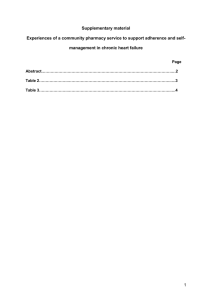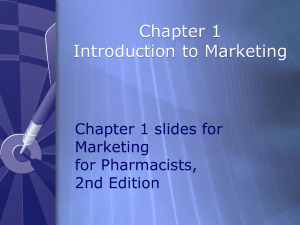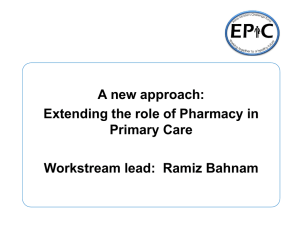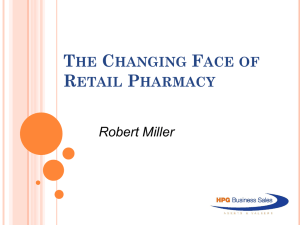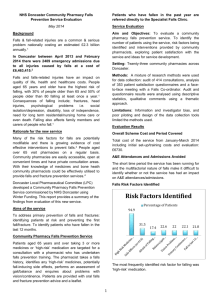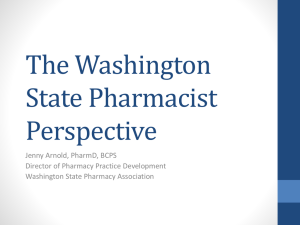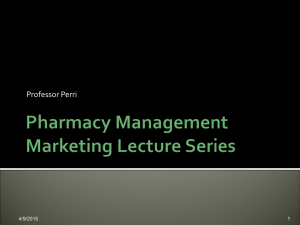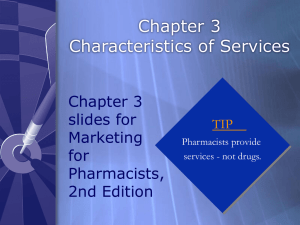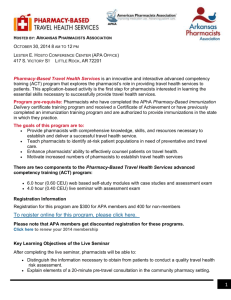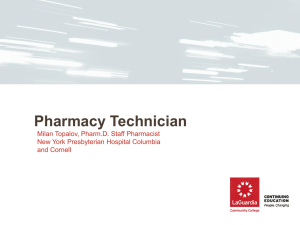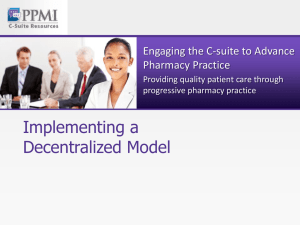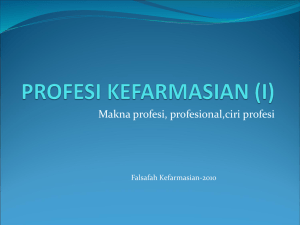Prasada Reddy
advertisement
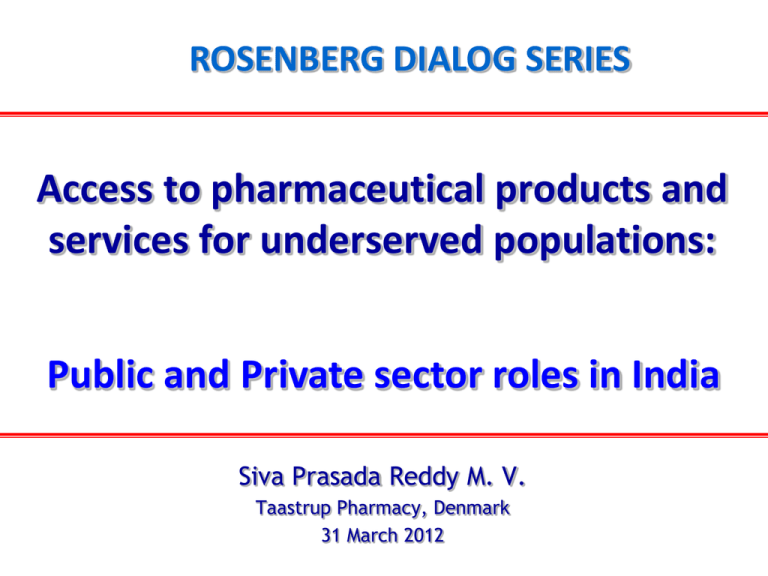
ROSENBERG DIALOG SERIES Access to pharmaceutical products and services for underserved populations: Public and Private sector roles in India Siva Prasada Reddy M. V. Taastrup Pharmacy, Denmark 31 March 2012 Healthcare system in India • Healthcare is provided by both private and public sectors • Center’s (Federal) responsibility to establish healthcare institutions accessible to all sections of the population • Treatment facilities provided by the Government through primary, secondary or tertiary levels of state healthcare institutions • In Central (Federal) and State Governments setups, medicines are supplied free of cost or against token payment to the weaker sections 2 Healthcare statistics in India • Expected GDP growth rates of around 10%, as against the figures of 7.9% from 2000 – 2008 • Total expenditure on health is one of the highest in the world – 84% as compared to just 16% public expenditure • The share of drugs in total outpatient treatment is 83% in rural and 77% in urban areas • The share of drugs in total inpatient treatment is 56% in rural and 47% in urban areas • Share of drug in health budget in central govt. is around 12 % • States ranging from 15% (southern) and less than 5% (Assam, Bihar, UP, Orissa)Q • Government committed to increase spending on public health 3 from less than 1% to 3% of GDP INDIA VISION 2020 “…improving access to health services to meet the health care needs…” - Planning Commission of India DOMINANT POLICIES OF HEALTH CARE National Health Policy “…an acceptable standard of good health amongst the general population of the country …” National Pharmaceuticals Policy: “…making available good quality medicines at reasonable prices….” 4 INDIAN PHARMA INDUSTRY • Indian pharma market ca. 20 bn. USD and expected to expand to 40b USD by 2015, with projected exports of 8.2b USD • Over 20,000 manufacturers, but only 250 are in “organized” sector, and account for 70% of total country's output • India exports medicine to over 200 countries and also boasts of having the largest USFDA approved facilities outside USA • India is the 4th largest manufacturer of pharmaceuticals in the global market in terms of volume of sales. 14th globally in terms of value. • 85% of drugs in India were sold through retail outlets and institutional sales account for 15% • India has one the lowest medicines prices in the world Deployment of pharmacists Untapped potential Retail + Wholesale Outlets Pharmacists registered Probotation off. In banks 0.25% Appraisers & DRA 0.25% Higher Studies 7.63% ca. 600,000 ca. 700,000 Mfg. 7.63% • Density of health care workers in India is a little over 8 per 10,000 population Mktg. 5%0 Analytical Chem. 1.27% Teaching 1.27% Hospital Pharmacy 26% Of total health workers: • Allopathic physicians 31% • Nurses and midwives 30% • Traditional medicine practitioners 9% • Pharmacists 11% By 2020, the demand of pharmacists and pharmaceutical scientists is expected to grow from 700,000 to almost 1.5 million Retail Pharmacy 51.08% Every year nearly: • 20,000 D. Pharm. (2 years), • 30,000 B. Pharm. (4 years), • 6000 M. Pharm., and • 700 Pharm. D (6 years). students graduate in the country. Pharmacy Practice Issues • Insufficient data on distribution of pharmacists in urban, rural and backward areas • No Continuing Professional Development (CPD) and Continuing Education (CE) program • Migration of pharmacists Pharmacy Practice Issues • Historically, pharmacists have not found mention in government's health and pharmaceutical policies, perhaps due to lack of clarity of their role and their potential beyond supply of pharmaceutical products. • The service levels of patient care require substantial improvement. • The curriculum needs a change as the current curriculum is not patient oriented, but has a strong bias towards industry. The ideal would be to upgrade minimum qualification for registration as pharmacist to a level capable of developing countries (e.g. USA). LARGE PRESENCE NO RECOGNITION! Policy makers should view pharmacies as part of the health care sector and pharmacists as health care professionals providing health care services and focus on them as they do with other health care professionals Pharmacists Remuneration • Many retail outlets/PHCs do not have pharmacist employed and many pharmacy owners do not see need for it • Pharmacists’ remuneration does not reimburse pharmacist cost • Pharmacist’s salary most lucrative in Industry and Teaching. Salaries in hospital and retail pharmacy outlets are sub-minimal • Retail pharmacy owners consider costs of hiring pharmacists very high Pharmacist initiatives to improve Pharmaceutical Services • GPP was introduced in the country in 2002, and there is awareness about the same across the country • Various associations are involved in providing continuing professional development to pharmacists from time-to-time • Many pharmacy colleges in South India started Masters in Pharmacy Practice Program following the recommendations of the Mysore Declaration • To strengthen pharmacy practice in India, in 2008, PCI started the 6 year Pharm. D. including 3 year post baccalaureate program for the pharmacy graduates. These pharmacists are trained to offer pharmaceutical care services to patients both in hospital and community pharmacies. • 50 drug information centers functioning across the country • In 2005, Government of India started the pharmacovigilance program Pharmacist initiatives to improve Access to Medicines in India • India’s flagship National Rural Health Mission (NRHM), one of the biggest interventions of its kind in the health sector in the world and is expected to cover more than 600 million people, especially women and children in rural areas. • In spite of the low cost of medicines, they (medicine) account for up to 50-80% of healthcare costs in India. There is this pressing need to improve access to quality medicines & make them more affordable to the masses. • To bring all 354 drugs named in the National List of Essential Medicines (NLEM) under price cap. • The government has initiated a host of programs including setting up of generic stores (Jan Aushadhi) that would provide generic unbranded medicines. 12 NATIONAL HEALTH PROGRAMME RNTCP • • • • Increase access at community level Improve quality of DOTS in the private sector Establish pharmacies as key stakeholders Promote IEC (Info. Edu. Comm.) on TB and DOTS through private pharmacies • Deploy Pharmacists and pharmacy students DOTS: Directly Observed, Short Course PHARMACISTS as part of RNTCP 14 DOTS: Directly Observed, Short Course NATIONAL HEALTH PROGRAMME ROLLBACK MALARIA • Improved and prompt access to effective treatment • Early detection of and response to malaria epidemics • Malaria Fact Cards for use in urban areas • Flip Charts or Pictograms for use in rural areas NATIONAL HEALTH PROGRAMME FAMILY PLANNING • Displaying contraceptives at prominent place in pharmacy with appropriate signage • Distributing literature freely • Being counsellors next door • Spreading the message of small family norm and its advantages NATIONAL HEALTH PROGRAMME HIV/AIDS • Blood safety • Condom Programming • IEC and Social mobilization • Care, support and treatment of people living with HIV/AIDS • Training on HIV/AIDS/STD prevention and control • Prevent of HIV from Mother to Child • Integrated Counselling and Testing PHARMACOVIGILANCE National Centre CDSCO National Pharmacovigilance Advisory Committee 2 Zonal Centers 5 Regional Centers N N N N N E E E E E S S S S S W W W W W 24 Peripheral centers National Pharmacovigilance Programme 0.074 % (8 out of 10,743 samples) 0.046 % (11 out of 24,136 samples) National Medical Insurance Schemes 20 Thank you
